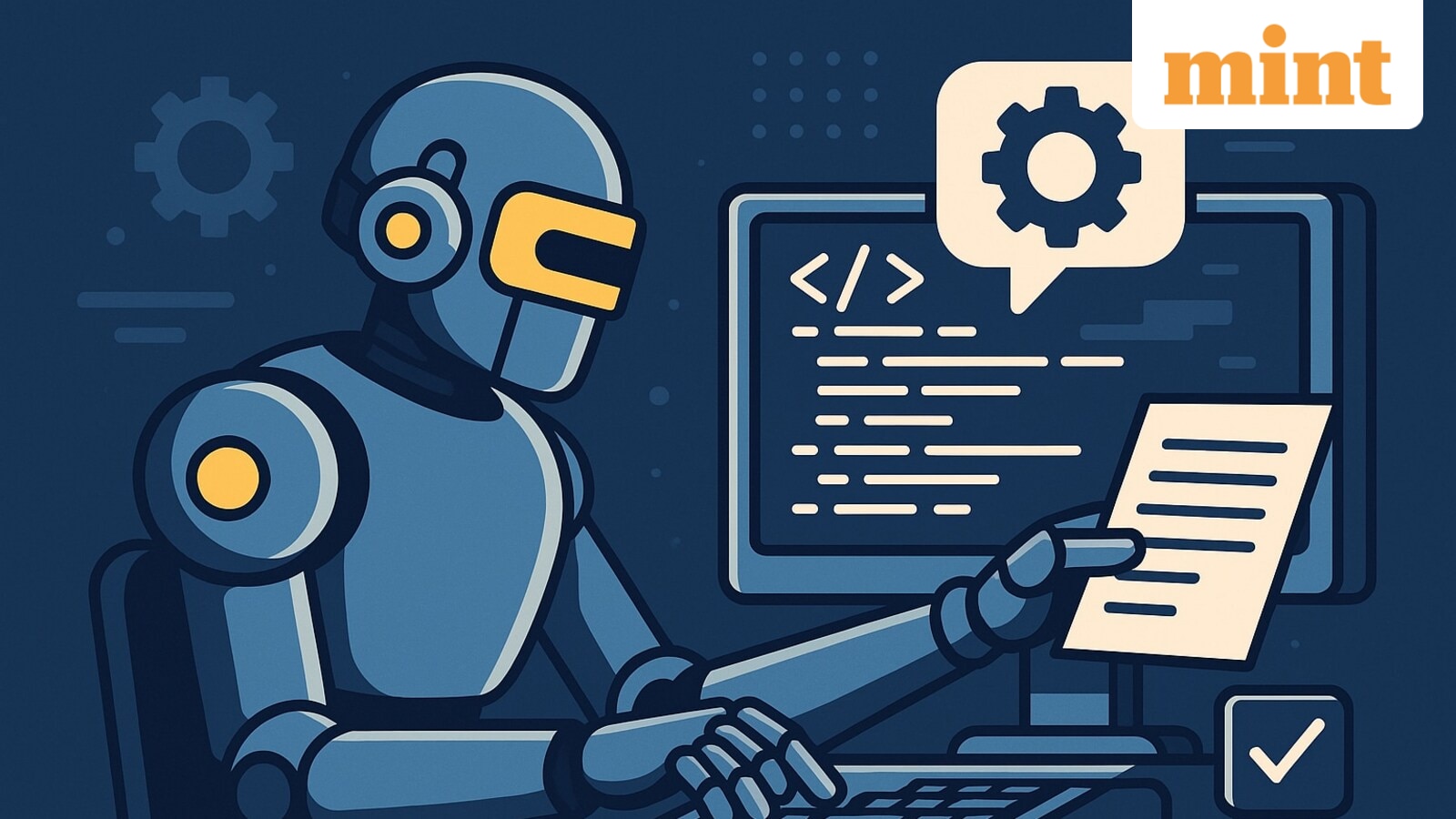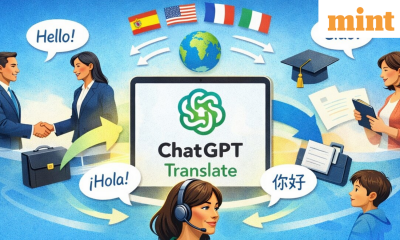

Metaverse
Mint Explainer | AI agents take the wheel in the new browser wars—what it means for users – Crypto News
The battle over agentic artificial intelligence (AI) browsers—tools that can book meetings, make purchases, and compare products on your behalf—is heating up, echoing the Netscape vs. Microsoft Internet Explorer clash of the 1990s. This time, Perplexity has thrown down the gauntlet by making its Comet browser free, joining rivals such as Opera Neon, DuckDuckGo, Dia, Bravo, and OpenAI’s AI shopping agent.
These autonomous browsers promise both convenience and disruption, while raising new questions about privacy, security, and the risks of unchecked automation.
Mint unpacks the latest developments.
What’s this battle all about?
Web browsers have long been gateways to the internet—but traditionally, browsing is manual. Users click links, type searches, compare products, and make purchases themselves. Agentic AI browsers change that. They can navigate websites, fill forms, execute transactions, negotiate prices, and even complete purchases automatically. The underlying web infrastructure remains the same, but user actions are increasingly delegated to AI.
Perplexity AI, founded by Aravind Srinivas, is raising the stakes with its free Comet browser. Like other agentic browsers such as Opera Neon and Dia, Comet can summarize pages, answer questions, automate searches, and still offer standard features like bookmarks, page translation, and support for most Chrome extensions.
View Full Image
History offers a cautionary tale: the 1990s browser war ended with Microsoft discontinuing Internet Explorer in 2022 and Netscape being acquired by AOL, which just recently shut down its dial-up service.
What exactly is Agentic AI?
Agentic AI, also known as AI agents, refers to models that can make autonomous decisions and act without human input. They are adaptable, decision-capable, and now even shop for you. OpenAI’s shopping agent in the US, for instance, enables users to buy via Instant Checkout, powered by Stripe’s Agentic Commerce Protocol—an open standard that allows AI, people, and businesses to complete purchases together.
As per Precedence Research, the global agentic AI market size accounted for $5.25 billion in 2024 and is forecast to rise from $7.55 billion in 2025 to about $199.05 billion by 2034. Gartner predicts that by 2028, one-third of GenAI interactions will involve autonomous agents.
What about limitations like security, privacy, and accuracy?
Autonomy comes with trade-offs. Handling sensitive data makes agentic AI browsers vulnerable to misuse, leaks, or hidden sharing. AI agents can churn out code quickly, but errors without human oversight remain likely. Even advanced agents can hallucinate, miss mistakes, or sabotage systems they’re meant to improve. A Model Evaluation & Threat Research (METR) randomized controlled trial found developers using AI tools took 19% longer to complete tasks.
Security is another concern: 80% of breaches involve compromised identities, and generative AI amplifies this risk by enabling more sophisticated phishing and social engineering, according to Eric Kelleher, president and COO of Okta, a cloud-based identity and access management services company.
What are the other big concerns?
Many vendors, according to research and advisory firm Gartner, are rushing to add agentic features to their roadmaps, driven by market pressure and competitive noise but few are pausing to validate use cases or model the operational complexity.
As the coexistence of AI and human workers enhances efficiency, it will also require a re-evaluation of job roles. Ethical and security risks add to the concerns, as AI agents could be weaponized for phishing, misinformation, or cyberattacks. Moreover, as AI agents continue to evolve, governments must step in with regulations to ensure accountability, or we may see a rise in lawsuits over flawed AI-driven decisions.
As AI agents advance, governments will need to regulate for accountability—or risk a surge in lawsuits over flawed AI decisions.
How to address the issue?
Due to rapid adoption, the number of agentic identities is expected to exceed 45 billion this year—over 12 times the global workforce—yet only 10% of executives surveyed by Okta have strategies to manage them.
Kelleher recommends limiting agent access to defined time windows, enforcing interoperability standards, and implementing strong monitoring and auditing to maintain control.
Agentic AI browsers can mitigate privacy risks by limiting data collection, giving users control over AI actions, ensuring strong security, and being transparent about data use, often detailed in their frequently asked questions (FAQs) section. Compliance with regulations and industry standards further strengthens safety and accountability.
Gartner advises building explainability into the user experience, restricting autonomy to controlled environments, and implementing fail-safes and oversight. The firm encourages vendors to tie pricing to measurable outcomes, like time saved or error reduction.
Further, AI agents require unique identities to access data and workflows, managed via application programming interface (API) tokens or cryptographic certificates rather than human passwords or multi-factor authentication (MFA).
Without strict governance, these identities risk excessive access and autonomy. Robust frameworks must control permissions and continuously monitor activity to prevent hidden vulnerabilities.
-

 Blockchain7 days ago
Blockchain7 days agoThe Quantum Clock Is Ticking on Blockchain Security – Crypto News
-

 Technology1 week ago
Technology1 week agoHow Americans are using AI at work, according to a new Gallup poll – Crypto News
-

 Technology1 week ago
Technology1 week agoHow Americans are using AI at work, according to a new Gallup poll – Crypto News
-

 Blockchain1 week ago
Blockchain1 week agoTether Launches Dollar-Backed Stablecoin USAT – Crypto News
-

 Metaverse4 days ago
Metaverse4 days agoContext engineering and the Future of AI-powered business – Crypto News
-

 Cryptocurrency1 week ago
Cryptocurrency1 week agoRiver Crypto Token Up 1,900% in the Last Month—What’s the Deal? – Crypto News
-

 Metaverse3 days ago
Metaverse3 days agoStop panicking about AI. Start preparing – Crypto News
-

 others1 week ago
others1 week agoUS Heiress Slaps Billion-Dollar Lawsuit on Banks for Allegedly Aiding the Looting of Her $350,000,000 Trust Fund – Crypto News
-

 Blockchain1 week ago
Blockchain1 week agoTrump-Backed WLFI Snaps Up 2,868 ETH, Sells $8M WBTC – Crypto News
-

 Blockchain1 week ago
Blockchain1 week agoTrump-Backed WLFI Snaps Up 2,868 ETH, Sells $8M WBTC – Crypto News
-

 Blockchain1 week ago
Blockchain1 week agoUS Storm Smashes Bitcoin Mining Power, Sending Hash Rates Tumbling – Crypto News
-

 Metaverse1 week ago
Metaverse1 week agoIs AI eating up jobs in UK? New report paints bleak picture – Crypto News
-

 Cryptocurrency1 week ago
Cryptocurrency1 week agoTrump family-backed American Bitcoin achieves 116% BTC yield – Crypto News
-

 Cryptocurrency1 week ago
Cryptocurrency1 week agoRiver price defies market downturn, explodes 40% to new ATH – Crypto News
-

 Metaverse4 days ago
Metaverse4 days agoContext engineering and the Future of AI-powered business – Crypto News
-

 Metaverse4 days ago
Metaverse4 days agoContext engineering and the Future of AI-powered business – Crypto News
-

 Blockchain1 week ago
Blockchain1 week agoBitcoin Gets the Macro Bug as $87,000 Comes Into Play – Crypto News
-

 Cryptocurrency1 week ago
Cryptocurrency1 week agoMakinaFi hit by $4.1M Ethereum hack as MEV tactics suspected – Crypto News
-

 Technology1 week ago
Technology1 week agoHow Americans are using AI at work, according to a new Gallup poll – Crypto News
-

 others1 week ago
others1 week agoPBOC sets USD/CNY reference rate at 6.9843 vs. 6.9929 previous – Crypto News
-

 Blockchain1 week ago
Blockchain1 week agoKalshi Expands Political Footprint with DC Office, Democratic Hire – Crypto News
-

 Technology1 week ago
Technology1 week agoElon Musk says ‘WhatsApp is not secure’ amid Meta privacy lawsuit; Sridhar Vembu cites ‘conflict of interest’ – Crypto News
-
Technology1 week ago
Fed Rate Cut Odds in January Crash to 99% Ahead of Dollar Yen Intervention- Will BTC React? – Crypto News
-
Cryptocurrency1 week ago
Fed Rate Cut Odds in January Crash to 99% Ahead of Dollar Yen Intervention- Will BTC React? – Crypto News
-

 Blockchain1 week ago
Blockchain1 week agoBitcoin Gets the Macro Bug as $87,000 Comes Into Play – Crypto News
-
Business1 week ago
Bitcoin and XRP Price At Risk As US Govt. Shutdown Odds Reach 73% – Crypto News
-
Business1 week ago
Bitcoin and XRP Price At Risk As US Govt. Shutdown Odds Reach 73% – Crypto News
-
Business1 week ago
Bitcoin Sentiment Weakens BTC ETFs Lose $103M- Is A Crash Imminent? – Crypto News
-
Business1 week ago
Japan Set to Launch First Crypto ETFs as Early as 2028: Nikkei – Crypto News
-

 Cryptocurrency1 week ago
Cryptocurrency1 week agoRYO Digital Announces 2025 Year-End Milestones Across Its Ecosystem – Crypto News
-

 Cryptocurrency1 week ago
Cryptocurrency1 week agoRiver Crypto Token Up 1,900% in the Last Month—What’s the Deal? – Crypto News
-
Business1 week ago
Experts Advise Caution As Crypto Market Heads Into A Bearish Week Ahead – Crypto News
-
Business1 week ago
Experts Advise Caution As Crypto Market Heads Into A Bearish Week Ahead – Crypto News
-

 Blockchain1 week ago
Blockchain1 week ago‘Most Reliable’ Bitcoin Price Signal Hints at a 2026 Bull Run – Crypto News
-
Technology1 week ago
Bitcoin And XRP Price Prediction Ahead of FOMC Meeting Tomorrow, Jan 28 – Crypto News
-
Technology1 week ago
Bitcoin And XRP Price Prediction Ahead of FOMC Meeting Tomorrow, Jan 28 – Crypto News
-
Technology1 week ago
Bitcoin And XRP Price Prediction Ahead of FOMC Meeting Tomorrow, Jan 28 – Crypto News
-
Business1 week ago
Bitcoin Faces Renewed Volatility as Investors Explore Options Like Everlight – Crypto News
-
others1 week ago
Jerome Powell Speech Tomorrow: What to Expect From Fed Meeting for Crypto Market? – Crypto News
-
Technology1 week ago
Fed Rate Cut Odds in January Crash to 99% Ahead of Dollar Yen Intervention- Will BTC React? – Crypto News
-
Business1 week ago
Bitcoin and XRP Price At Risk As US Govt. Shutdown Odds Reach 73% – Crypto News
-
others1 week ago
U.S. Shutdown Odds Hit 78% as CLARITY Act Faces Fresh Uncertainty – Crypto News
-

 others1 week ago
others1 week ago478,188 Americans Warned After Hackers Strike Government-Related Firm Handling Sensitive Personal Data – Crypto News
-
Technology1 week ago
Crypto Events to Watch This Week: Is the Market Entering a New Recovery Phase? – Crypto News
-

 Blockchain1 week ago
Blockchain1 week agoCZ Won’t Return to Binance, Bullish on Bitcoin Supercycle – Crypto News
-

 Blockchain1 week ago
Blockchain1 week agoSolana (SOL) Slips Further As Bears Target Deeper Support Zones – Crypto News
-

 Technology1 week ago
Technology1 week agoIs TikTok still down in the United States? Check current status – Crypto News
-

 Cryptocurrency1 week ago
Cryptocurrency1 week agoThe productivity bull case for almost everything – Crypto News
-
Business1 week ago
Experts Advise Caution As Crypto Market Heads Into A Bearish Week Ahead – Crypto News
-
Technology1 week ago
Bitcoin And XRP Price Prediction Ahead of FOMC Meeting Tomorrow, Jan 28 – Crypto News








